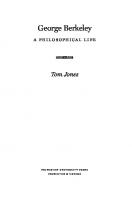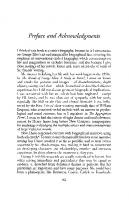George Gascoigne: A Hundreth Sundrie Flowres 9780198117797
625 80 58MB
English Pages 847 Year 2000
Recommend Papers

- Author / Uploaded
- George Gascoigne
- G.W. Pigman
File loading please wait...
Citation preview
GEORGE GASCOIGNE A Hundreth Sundrie Flowres
GEORGE GASCOIGNE
A Hundreth Sundrie Flowres Edited with an Introduction and Commentary by
G. W. Pigman III
CLARENDON PRESS . OXFORD
This book has been printed digitally and produced in a standard specification in order to ensure its continuing availability
OXFORD UNIVERSITY PRESS
Great Clarendon Street, Oxford OX2 6DP Oxford University Press is a department of the University of Oxford. It furthers the University's objective of excellence in research, scholarship, and education by publishing worldwide in Oxford New York Auckland Cape Town Dar es Salaam Hong Kong Karachi Kuala Lumpur Madrid Melbourne Mexico City Nairobi New Delhi Shanghai Taipei Toronto With offices in Argentina Austria Brazil Chile Czech Republic France Greece Guatemala Hungary Italy Japan South Korea Poland Portugal Singapore Switzerland Thailand Turkey Ukraine Vietnam Oxford is a registered trade mark of Oxford University Press in the UK and in certain other countries Published in the United States by Oxford University Press Inc., New York © G. W. Pigman III, 2000
Not to be reprinted without permission The moral rights of the author have been asserted Database right Oxford University Press (maker) Reprinted 2008 All rights reserved. No part ofthis publication may be reproduced, stored in a retrieval system, or transmitted, in any form or by any means, without the prior permission in writing of Oxford University Press, or as expressly permitted by law, or under terms agreed with the appropriate reprographics rights organization. Enquiries concerning reproduction outside the scope of the above should be sent to the Rights Department, Oxford University Press, at the address above You must not circulate this book in any other binding or cover And you must impose this same condition on any acquirer ISBN 978-0-19-811779-7 Printed and bound by CPI Antony Rowe, Eastbourne
For Celeste, George, and Margaret
ACKNOWLEDGEMENTS Many people and institutions have helped me over the years that I have been working on this edition, and I apologize if I have forgotten to mention anyone. I am very grateful for all of the help I have received. A fellowship from the Huntington Library allowed me to collate the texts. The Division of Humanities and Social Sciences at Caltech generously supported my work. Interlibrary Loan at Caltech's Millikan Library patiently tracked down hundreds of obscure requests. Staff at the Bodleian Library, the British Library, the Folger Shakespeare Library, and the Houghton Library of Harvard University kindly assisted me on research visits. Staff at several other institutions answered questions for me: Bancroft Library, University of California, Berkeley; Bedfordshire Record Office; Beinecke Library, Yale University; Cudahy Library, Loyola University, Chicago; Institute of Classical Studies, London; John Hay Library, Brown University; McCormick Library, Northwestern University; National Library of Scotland; Newberry Library; Norfolk Record Office; Public Record Office, London; and University of Sydney Library. I thank the Arizona Center for Medieval and Renaissance Studies for permission to reprint portions of 'Editing Revised Texts: Gascoigne's A Hundreth Sundrie Flowres and The Posies', from New Ways of Looking at Old Texts, II: Papers of the Renaissance English Text Society, 1992-1996, ed. W. Speed Hill, MRTS vol. 188 (Tempe, Arizona, Igg8), I-g, © Arizona Board of Regents for Arizona State University. Since I disagree with him so often, I should state at the outset my great obligation to C. T. Prouty, whose biography of Gascoigne and edition of A Hundreth Sundrie Flowres have always been at my elbow. Several friends and colleagues have answered questions, read drafts, or discussed Gascoigne with me: Albert Ascoli, Peter Beal, Gordon Braden, Jessica Dietrich, Robert Eagleson, Philip Gaskell, Anthony Grafton, Lawrence Green, Richard Helgerson, Speed Hill, Grace Ioppolo, William Kennedy, John Kerrigan, Nicolas Kiessling, Joseph Lowenstein, Patricia Parker, Joshua Scodel,
viii
ACKNOWLEDGEMENTS
Debora Shuger, Diana Speed, Gabrielle Starr, and Henry Woudhuysen. Adrian Weiss was exceptionally helpful with the printing ofthe 1573 edition. Peter Bossaerts, Henk Bruin, and Marc van der Poel helped me with sixteenth-century Dutch, and Daniel Garcia with sixteenth-century Spanish. Gillian Evans, Juliet Field, P. M. Gilliver, Simon Hunt, John Simpson, and S. K. Tulloch of the Oxford English Dictionary answered several queries about peculiarities of Gascoigne's usage. Frances Whistler and Leofranc HolfordStrevens of Oxford University Press solved a puzzle involving Gascoigne's metrical notation. I also thank Frances for her meticulous editing-not to mention her patience. Dorothy McCarthy's painstaking copy-editing saved me from more mistakes than I care to recall. John Lavagnino and Dominik Wujastyk wrote the 'lEX macros used to compile the critical apparatus and to typeset this edition (see their Critical Edition Typesetting: The EDMAC format for plain TFiX (San Francisco and Birmingham, 1996)). John also helped with typesetting difficulties that had stumped me. Paul Cleal of Oxford University Press patiently and promptly answered my many questions about design and typesetting. lowe a special debt of gratitude to Gillian Austen, who read a draft of the entire edition. In her dissertation and in correspondence she has taught me much about Gascoigne or forced me to rethink positions that I have stubbornly continued to maintain.
CONTENTS Abbreviations and Short Titles Biographical Introduction Textual Introduction
xiii xxiii
xlv
A HUNDRETH SUNDRIE FLOWRES
1
The Contents of this Booke
2
The Printer to the Reader
3
Supposes Jocasta
5 59
The Adventures of Master F.J. The Devises of Sundrie Gentlemen 1. A translation of Ariosto allegorized 2. Written uppon a reconciliation betwene two freendes 3. Two gentlemen did roon three courses at the rynge 4. Not long after the writing hereof 5. He wrote to the same friend from Excester 6. He wrote to the same friend from Founteine belle eaii 7. He wrote unto a Skotish Dame 8. Written to a gentlewoman who had refused him 9. In prayse of a gentlewoman 10. He began to write by a gentlewoman 11. Whiles he sat at the dore of his lodging 12. An other Sonet written by the same Gentlewoman 13. Enough of this Dame 14. Written by a Gentlewoman in court 15. From this I will skip to certaine verses 16. With these verses you shall judge 17. And for a further profe 18. In all this lovely company was none 19. He held himselfe herwith contented 20. The Dame within very short space did aunswere 21. This Sonet of his shall passe ... without any preface
217 218 219 220 221 222 222 223 224 226 227 227 228 228 229 230 230 231 232 232 233
x 22. 23· 24· 25· 26. 27· 28. 29· 30 . 31 . 32. 33· 34· 35· 36 . 37· 38 . 39· 40 . 41. 42. 43. 44· 45· 46. 47· 48 . 49· 50. 51. 52. 53· 54· 55· 56. 57· 58. 59· 60. 61.
CONTENTS
He wrote . .. in prayse of a Gentlewoman Now to begin with another man To a Dame which challenged the aucthor A loving Lady being wounded in the spring time The careful lover combred with pleasure The lover being disdaynfully abjected An absent Dame thus complayneth This question being propounded by a Dame A straunge passion of another Author The Lover leaning onely to his Ladies promises The constancie of a lover Now I must desire you with patience to hearken The Lover declareth his affection Another shorter discourse to the same effecte The lover disdaynefully rejected An absent lover . .. thus complayneth A Lady being both wronged by false suspect Eyther a needelesse or a bootelesse comparison An absent lover doth thus encourage his Lady A letter devised for a young lover Three Sonets in sequence A Ryddle To a gentlewoman who blamed him An uncurteous farewell to an unconstant Dame A lover often warned The lover encouraged by former examples The absent lover (in ciphers) disciphering his name Gascoigns Anatomie Gascoignes araignement Gascoignes prayse of Bridges, nowe Ladie Sandes Gascoignes prayse of Zouche Gascoignes passion Gascoignes lib ell of Divorce Gascoignes praise of his Mystres Gascoignes Lullabie Gascoignes Recantation I have herde master Gascoignes memorie commended The nexte was at request of Antonie Kynwelmarshe John Vaughan delivered him this theame Alexander Nevile delivered him this theame
233 235 236 237 238 239 241 242 243 244 245 245 247 247 248 249 251 253 254 255 256 257 258 259 259 260 262 26 3 264 266 26 7 26 7 269 270 272 273 274 275 276 278
CONTENTS
62. Richarde Courtop ... gave him this theame 63. Gascoignes gloze uppon . .. Dominus iis opus habet 64. Gascoignes good morow 65. Gascoignes good nyghte 66. Gascoignes De profundis 67. [The translated Psalme of Deprofundis] 68. Gascoignes councell to Douglasse Dive 69. Gascoignes councell given to . .. Bartholmew Withipoll 70. Gascoignes Epitaph uppon capitaine Bourcher 71. Gascoignes devise of a maske 72. Gascoignes wodmanship 73. Gascoignes gardnings 74. In that other ende of his sayde close walke 75. In a chayre in the same Garden 76. Upon a stone in the wall of his Garden 77. Gascoignes voyage into Hollande, An. 1572 Dan Bartholmew of Bathe 1. The Reporter 2. Dan Bartholmew his Triumphes 3. The Reporter 4. Dan Bartholmews Dolorous discourses 5. The extremitie of his Passion 6. 'Lo thus (deere hart) I force my frantike Muse' 7. His lib ell of request exhibited to Care 8. 'What greater glory can a Keysar gaine' 9. His last will and Testament 10. 'Alas, 10 now I heare the passing Bell' 11. His Farewell 12. The reporters conclusion unfinished
ri
281 283 286 288 290 290 293 295 300 301 312 316 318 318 319 319 329 333 336 337 347 348 349 351 353 355 356 356
ADDITIONS FROM THE POSIES Prefatory Letters 1. To the reverende Divines 2. To al yong Gentlemen 3. To the Readers generally
359 364 369
Commendatory Poems 4. T.B. In prayse of Gascoignes Posies 5. E.C. In prayse of Gascoignes Posies 6. M.C. commending the correction of Gascoignes Posies
371 372 373
xii 7· 8. 9· 10. 11. 12. 13· 14· 15· 16. 17· 18. 19· 20. 21.
CONTENTS
R.S. In prayse of Gascoignes Posies T.Ch. In prayse of Gascoignes Posies G.W. In prayse of Gascoigne, and his Posies P.B. to such as have heretofore found fault A.W. In commendation of Gascoigne and his Posies LB. In commendation of Gascoignes Posies LD. In prayse of Gascoigne and his Posies The Printer in commendation of Gascoigne M.A. Perugino, a i lettori 1. de B. aux lecteurs H.M. In Poemata Gascoigni Carmen B.C. In Poemata Gasconi Carmen K.D. In eundem, Carmen Eiusdem de eodem P.W. In Gascoignum, Carmen G.H. pro eodem E.H. in poemata Gascoigni, Carmen The opinion of the aucthor himself His ultimum vale to Amorous verse
22. 23· 24· 25· Dan Bartholmew of Bathe 26. Dan Bartholmew his second Triumphe 27· Continuation of 'The reporters conclusion' 28. The fruites of Warre 29· The fruite of Fetters 3 0 . The complaint of the greene Knight 3 1 . The continuance of the Author 3 2 . The greene Knights farewell to Fansie 33· Epilogismus 34· Certayne notes of Instruction
Commentary Contents of The Posies Index of First Lines Verse Forms Glossary General Index
373 374 376 377 378 379 380 381 381 382 382 383 383 383 384 384 385 385 386 386 387 398 439 442 448 45 2 453 454 463 741 743 746 748 773
ABBREVIATIONS AND SHORT TITLES References to this edition are to (1) act, scene, and line number for the plays; (2) page and line number for prose; or (3) poem number (in bold) and line number for poems (e.g. '5. 3' refers to line 3 on page 5, while 5. 3 refers to the third line of the fifth poem). The twelve poems in the first edition of 'The delectable historie of sundry adventures passed by Dan Bartholmew of Bathe' are separately numbered and prefixed with 'DB'. 'Additions from The Posies' are prefixed with 'P'. 'The fruites of Warre' (P 28) is a special case, since each stanza is numbered in the original: reference is to stanza and line number. Place of publication is London unless otherwise specified.
(i) Abbreviations in the Critical Apparatus 73
73 c 73f 75
75f 75 m 75 F 75 H 87 MS Clegg Cunliffe Hazlitt Lawlis
A Hundreth sundrie Flowres ([1573]). Catchword in 73. 'Faultes escaped' in 73. The Posies of George Gascoigne Esquire (1575). 'Faultes escaped in the Weedes' in 75. Marginal notes or glosses added in 75. 'Flowers' in 75 (63 only). 'Hearbes'in 75 (63 only). The Whole woorkes of George Gascoigne Esquyre (15 87). British Library, Add. MS 34063 (Jocasta only). Cyndia Susan Clegg, Press Censorship in Elizabethan England (Cambridge, 1997), 104. The Complete Works of George Gascoigne, ed. John W. Cunliffe (Cambridge, 1907-10). The Complete Poems of George Gascoigne, ed. William Carew Hazlitt (1869-70). Elizabethan Prose Fiction, ed. Merritt Lawlis (Indianapolis, 1967).
xiv
ABBREVIATIONS AND SHORT TITLES
Prouty Puttenham
George Gascoigne's 'A Hundreth Sundrie Flowres', ed. C. T. Prouty (Columbia, Missouri, 1942). [George PuttenhamJ, The Arte of English Poesie (15 89), Y3·
(ii) Gascoigne's Works Antwerpe 'Bacon'
Barlow
Bond Cunliffe
DB Diet Droomme Early FJ 'Gilbert'
Glas Governement Grief Hazlitt Hemetes J
The Spoyle of Antwerpe, in W. Letter to Sir Nicholas Bacon, 1 January 1577, in The Papers of Nathaniel Bacon of Stiffkey, ed. A. Hassell Smith and Gillian M. Baker (Norwich, 1983), ii. 3~4. Richard Geldart Barlow, 'The Complete Works of George Gascoigne' (University of Michigan Ph.D. diss., 1976). Supposes, in Early Plays from the Italian, ed. R. Warwick Bond (Oxford, 1911). The Complete Works of George Gascoigne, ed. John W. Cunliffe (Cambridge, 1907~1O). All references are to Cunliffe's text of 75, which is contained in the first volume. 'The delectable historie of sundry adventures passed by Dan Bartholmew of Bathe'. A delicate Diet, for daintiemouthde Droonkardes, in W. The Droomme of Doomes day, in W. Jocasta, in Early English Classical Tragedies, ed. John W. Cunliffe (Oxford, 1912). A discourse of the adventures passed by Master F.J. Prefatory letter to Sir Humphrey Gilbert, A Discourse of a Discoverie for a new Passage to Cataia, in W. The Steele Glas, in W. The Glasse of Governement, in W. The Grief of Joye, in W. The Complete Poems of George Gascoigne, ed. William Carew Hazlitt (1869~70). The Tale of Hemetes the Heremyte, in W. Jocasta.
ABBREVIATIONS AND SHORT TITLES
Kenelworth
Notes Phylomene Prouty, HSF
S Salzman
SJ
Venerie
W
xv
A briefe rehears all, or rather a true Copie of as much as was presented before her majestie at K enelworth, during her last aboade there, in W. Certayne notes of Instruction concerning the making of verse or ryme in English. The complaynt of Phylomene, in W. George Gascoigne's 'A Hundreth Sundrie Flowres', ed. C. T. Prouty (Columbia, Missouri, 1942). Supposes. F J in Paul Salzman, An Anthology of Elizabethan Prose Fiction (Oxford, 1987). Supposes and Jocasta: Two Plays Translated from the Italian, the First by Geo. Gascoigne, the Second by Geo. Gascoigne and F. Kinwelmersh, ed. John W. Cunliffe (Boston, 1906). The Noble Arte of Venerie or Hunting (1575). I cite Turbervile's Booke of Hunting 1576 (Oxford, 1908), which attributes the translation to George Turbervile. The Complete Works of George Gascoigne, ed. John W. Cunliffe (Cambridge, 1907-10). All references are to the second volume.
(iii) Other Abbreviations and Short Titles Ariosto, Cinque Canti
Ludovico Ariosto, Cinque Canti, trans. Alexander Sheers and David Quint (Berkeley, 1996). (This edition includes the Italian text established by Cesare Segre in his edition of Ariosto's Opere minori (Milan, 1954).) Ariosto, Orlando Ariosto, Orlando Ludovico Ariosto, Orlando fufurioso rioso, ed. Marcello Turchi (Milan, 1974). Ascham Roger Ascham, English Works, ed. William Aldis Wright (Cambridge, 1904). Austen Gillian Austen, 'The Literary Career of George Gascoigne: Studies in Self-Presentation' (D.Phil. thesis, Oxford University, 1996). Breton, Poems Nicholas Breton, Poems not hitherto reprinted, ed. Jean Robertson (Liverpool, 1952).
XVI
ABBREVIATIONS AND SHORT TITLES
Breton, Works
The Works in Verse and Prose of Nicholas Breton, ed. Alexander B. Grosart (Edinburgh, 1879). Ludovico Ariosto, Commedie, in Tutte Ie opere, Casella iv, ed. Angela Casella et al. (Milan, 1974). Chaucer The Riverside Chaucer, 3rd edn., ed. Larry D. Benson et al. (Boston, 1987). Churchyard and A True Discourse Historicall, of the Succeeding, Governours in the Netherlands, trans. and Robinson collected by Thomas Churchyard and Richard Robinson (1602). Clegg Cyndia Susan Clegg, Press Censorship in Elizabethan England (Cambridge, 1997). Conley C. H. Conley, The First English Translators of the Classics (New Haven, 1927). Cooper Thomas Cooper, Thesaurus linguae Romanae et Britannicae (1565). Correspondance Correspondance de Philippe II sur les affaires des Pays-Bas, ed. Louis Prosper Gachard (Brussels, 1848-1936). CSP For. Calendar of State Papers, Foreign Series, of the Reign of Elizabeth, 1572-74, ed. Allan James Crosby (1876). References are to the document number. R. W. Dent, Proverbial Language in English Dent Drama Exclusive of Shakespeare, 1495-1616: An Index (Berkeley, 1984). DNB Dictionary of National Biography. Elyot Sir Thomas Elyot, The Book named The Governor, ed. Henry Herbert Stephen Croft (1883). Emblemata Emblemata: Handbuch zur Sinnbildkunst des XVI. und XVII. Jahrhunderts, ed. Arthur Henkel and Albrecht Schone (Stuttgart, 1996). Erasmus Desiderius Erasmus, Adagia, in Opera Omnia (Leiden, 1703), ii. John Gerard, The herball or generall historie of Gerard plantes, enlarged by Thomas Johnson (1633; rpt. New York, 1975). Googe Barnabe Googe, Eglogs Epytaphes, and Sonettes (1563). Grange John Grange, The Golden Aphroditis (1577).
ABBREVIATIONS AND SHORT TITLES
Guevara
Handful Harvey Harvey, Letter-Book HPT1
HPT2 Hughey
Kilfoyle
Langham
Lyly Marotti Mastronarde May
Mendo









